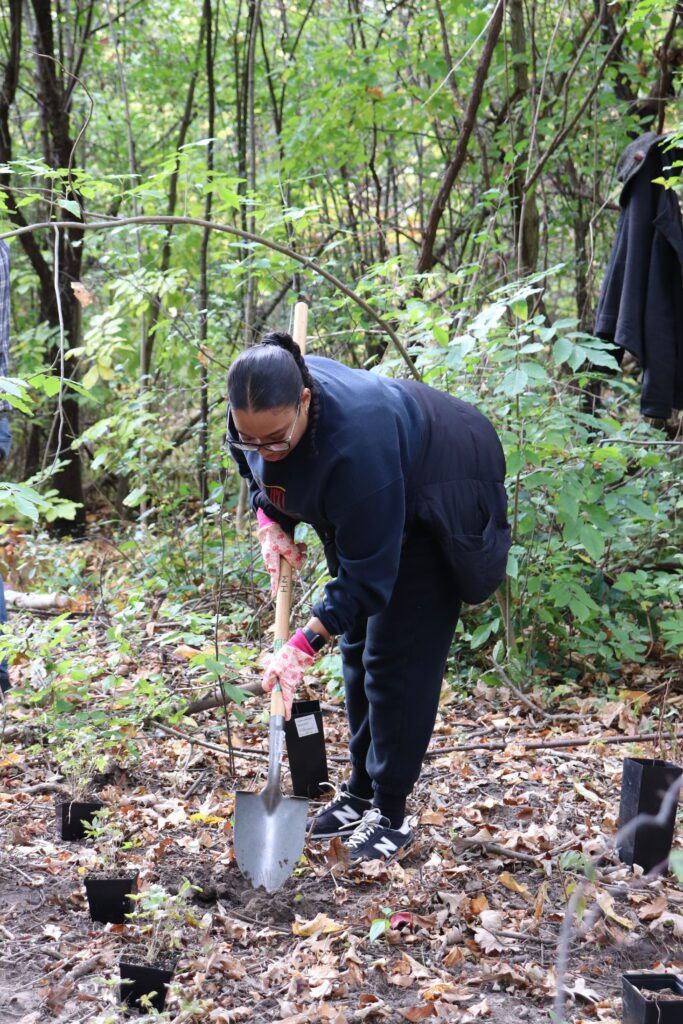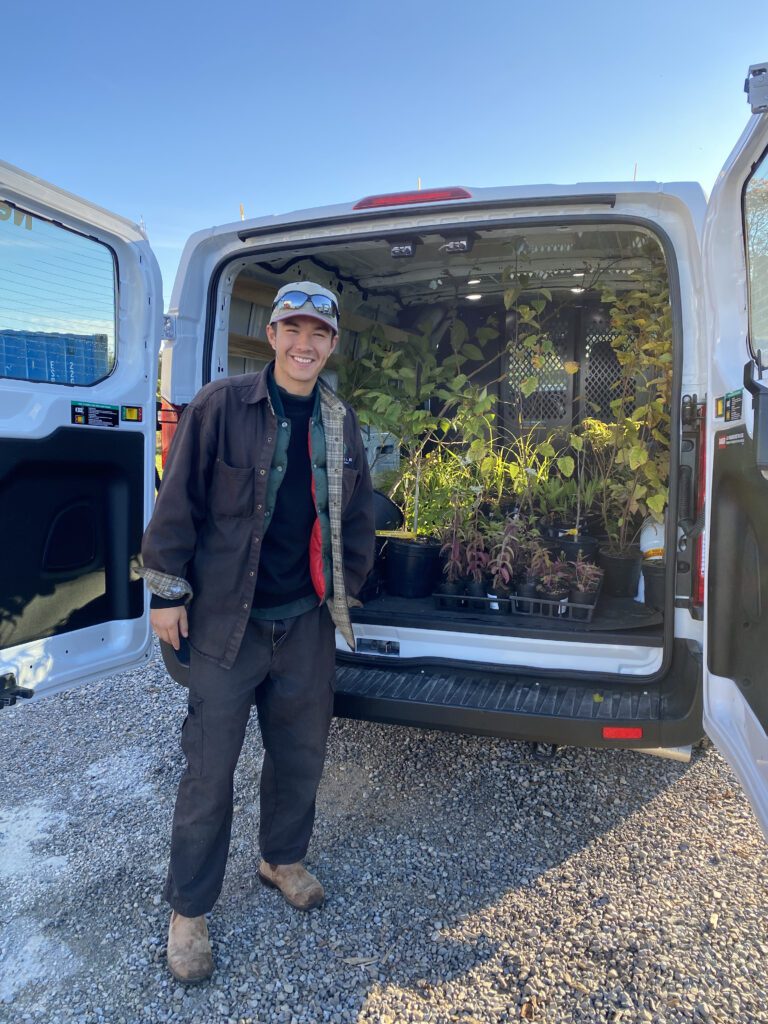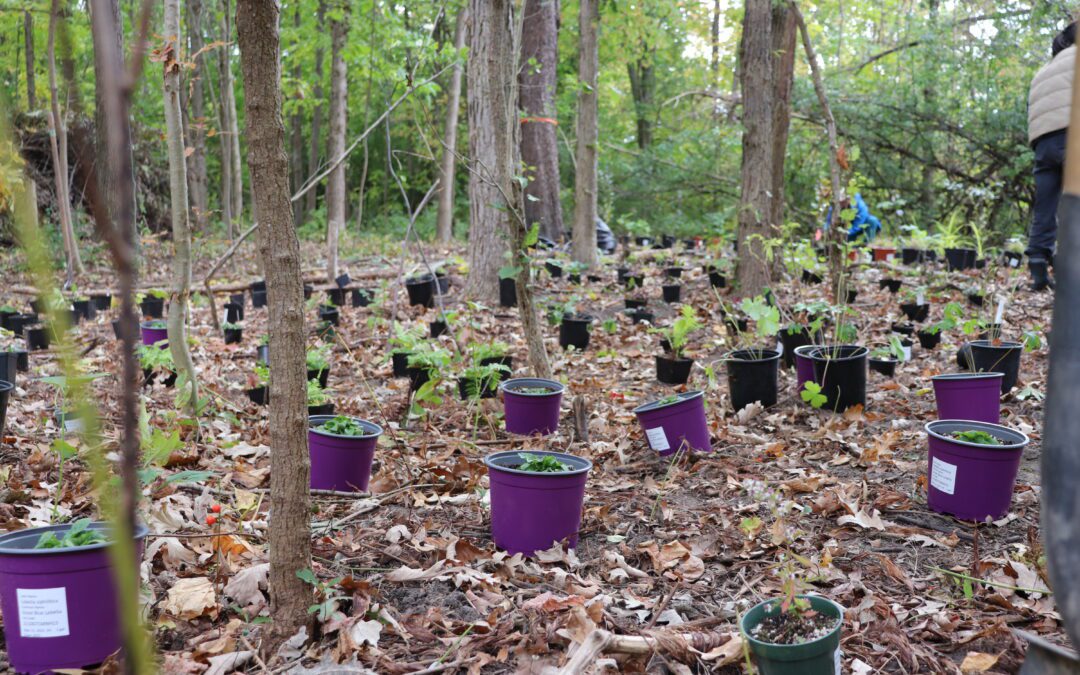In the autumn of 2023, RAINscapeTO embarked on a collaborative endeavor with the Humber River Lodge community to establish a mini forest along the Humber River trail in Toronto. This site, situated on the east side of the river between Eglinton and Lawrence, holds deep cultural significance as a gathering space managed by the Memtigwaake Kinomaage Maawnjiding Advisory Circle. Originally reclaimed by Toronto’s urban Indigenous community, the lodge features a teaching lodge, sweat lodges, and medicine gardens where native plants are grown for communal use and educational purposes. Preparations for the Mini Forest project began well in advance. A year prior, efforts focused on clearing invasive species like Burdock and preparing the land by removing vines and stumps to facilitate the planting of native flora. The culmination of these efforts came on October 14th, 2023, with a dedicated planting day that saw enthusiastic participation from members of the Humber River Lodge community, Toronto Nature Stewards, Toronto Green Community (TGC), and Indigenous youths from the ENAGB Indigenous Youth Agency.
 The day began with a poignant opening ceremony led by Elder Jacqueline Lavalle, featuring a historical overview of the site. Candace’s Catering provided nourishment during a break that followed, fostering a sense of community among participants. A planting demonstration, divided into groups, efficiently allocated tasks as volunteers planted native species pre-selected in consultation with local stakeholders and environmental experts. Highlighting the cultural depth of the project, Robert Nadjiwon led an engaging activity where plants were named in the Anishinaabemowin, reinforcing connections to Indigenous traditions and knowledge. The day concluded with a heartfelt closing ceremony, acknowledging the invaluable contributions of all involved and marking the successful establishment of the mini forest.
The day began with a poignant opening ceremony led by Elder Jacqueline Lavalle, featuring a historical overview of the site. Candace’s Catering provided nourishment during a break that followed, fostering a sense of community among participants. A planting demonstration, divided into groups, efficiently allocated tasks as volunteers planted native species pre-selected in consultation with local stakeholders and environmental experts. Highlighting the cultural depth of the project, Robert Nadjiwon led an engaging activity where plants were named in the Anishinaabemowin, reinforcing connections to Indigenous traditions and knowledge. The day concluded with a heartfelt closing ceremony, acknowledging the invaluable contributions of all involved and marking the successful establishment of the mini forest.
 Lessons Learned
Lessons Learned
![]() The project underscored the importance of community engagement and proactive planning. Consultations with the Humber River Lodge community and the ENAGB Indigenous Youth Agency ensured that the project aligned with local cultural practices and environmental goals. Despite high initial interest from youth volunteers, challenges arose with attendance on the planting day, prompting reflections on strategies for future projects to manage and maintain volunteer participation effectively.
The project underscored the importance of community engagement and proactive planning. Consultations with the Humber River Lodge community and the ENAGB Indigenous Youth Agency ensured that the project aligned with local cultural practices and environmental goals. Despite high initial interest from youth volunteers, challenges arose with attendance on the planting day, prompting reflections on strategies for future projects to manage and maintain volunteer participation effectively.
Final Thoughts
Beyond its ecological impact, the mini forest at Humber River Lodge stands as a testament to collaborative stewardship and cultural revitalization. By integrating diverse community members and emphasizing youth involvement, the project not only enhanced local biodiversity but also strengthened bonds to the land and cultural heritage. Looking ahead, RainscapeTO aims to build on these successes by fostering continued partnerships with organizations like Toronto Nature Stewards. These alliances promise to amplify the sustainability and community impact of future green infrastructure projects across Toronto. In conclusion, the Mini Forest initiative exemplifies how inclusive environmental efforts can empower communities and inspire collective action toward a more sustainable future. It serves as a blueprint for others seeking to undertake similar projects, showcasing the transformative potential of community-centered approaches in urban Indigenous environmental stewardship.
This project was supported by Green Communities Canada’s Living Cities Canada Fund.

Recent Comments